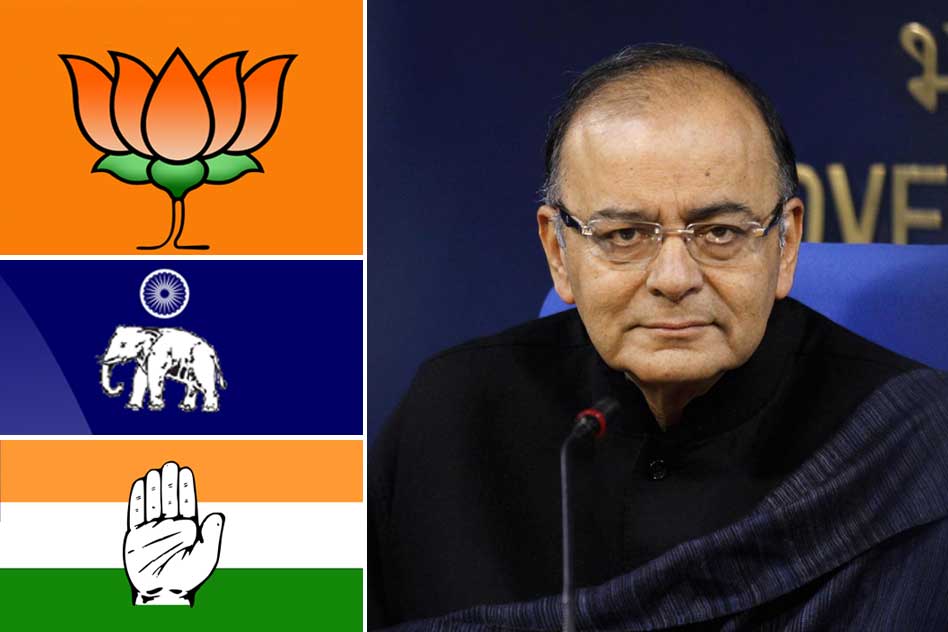
Capping Cash Donation To Political Parties At Rs 2000, An Appreciative Move But Is It Viable?
2 Feb 2017 11:07 AM GMT
On Wednesday, the Finance Minister of India, Arun Jaitley, presented the annual budget for the financial year 2017-18. One of the talking points of this year’s budget is lowering the limit for cash donations of political parties from Rs 20,000 to Rs 2,000 — a reduction of 90 per cent of the existing limit. The Finance Minister said that the decision was made after a recommendation by the Election Commission in December 2016 to ban any anonymous contribution “above or equal to” amount of Rs 2,000. The rule has been brought with the aim to instil transparency in political funding in the country.
If the proposals to amend the relevant laws are approved by Parliament, from April 2017 onwards, donations in cash can be made up to Rs. 2,000 only by any person; payments of higher value will be permitted only through cheques or digital mode and donors will be able to buy ‘electoral bonds’ that will be sold through commercial banks under the regulations made by the Reserve Bank of India. Some commentators have hailed this as a major step forward while some have expressed skepticism about this initiative.
Will it improve transparency?
Founding member of the Association of Democratic Reforms (ADR) Professor Jagdeep Chhokar said, “The limit on cash donation from one source set at Rs 2,000 for political parties will not make much difference.”
He feels that parties who do not want to declare the sources will convert the money into smaller amounts. “Parties now will resort to multiple receipts of Rs 1,999 each like they did to evade the old limit of Rs 20,000 cash donations, issuing multiple receipts of Rs 19,999. The contributions below Rs 2,000 will manage to evade scrutiny,” said the former professor at the Indian Institute of Management, Ahmedabad.
“Also as far as sources of donation are concerned, political parties receive 70% of the donation from unknown sources which will now come in units of less than Rs 2,000 each,” he added.
What could have been done?
Chhokar also mentioned that it would have been a sincere decision if the government had completely done away with cash donations. He believes it is the only way to bring transparency in the system.
“Like they say that rickshaw drivers and small shopkeepers should also take money through digital means. Then what is the need for political parties to take up to Rs 1,999 in cash? Why can’t they take it through digital transactions?,” Chhokar asked.
Many others agreed with Chhokar’s analysis.
Reducing cash limit for political funding from Rs 20K to Rs 2K is meaningless. Because there is no limit in number of persons. # Budget2017
— Yogendra Yadav (@_YogendraYadav) February 1, 2017
Eminent Indian lawyer and activist Prashant Bhushan tweeted:
Bogus!How will this clean up election funding?Parties don't declare source of cash.If ppl w/o accts are told to go cashless,why not parties? https://t.co/V7vXTADHOU
— Prashant Bhushan (@pbhushan1) February 1, 2017
Political analyst Amulya Ganguli said that lowering the cash limit may make political funding even less transparent than before.
“This is a very unrealistic attempt to curb black money in political funding. I think that larger sums will now remain unannounced,” Ganguli told IANS.
Sociologist Dipankar Gupta, however, hailed the Government’s decision said that this limit will make it difficult for the parties to accept large sums of unaccounted cash donations.
The Logical Indian appreciates the government’s step to lowering the cash donation limits to Rs 2,000 but will request the government to take concrete steps to stop the flow of unaccountable money into political parties. One of the steps can be to make donations completely cashless in line with the PM’s dream of making the Indian economy cashless.
Also read: Political Parties Received Rs 7,833 Crore Funding From Unknown Sources In Last 11 Years: ADR
 All section
All section













